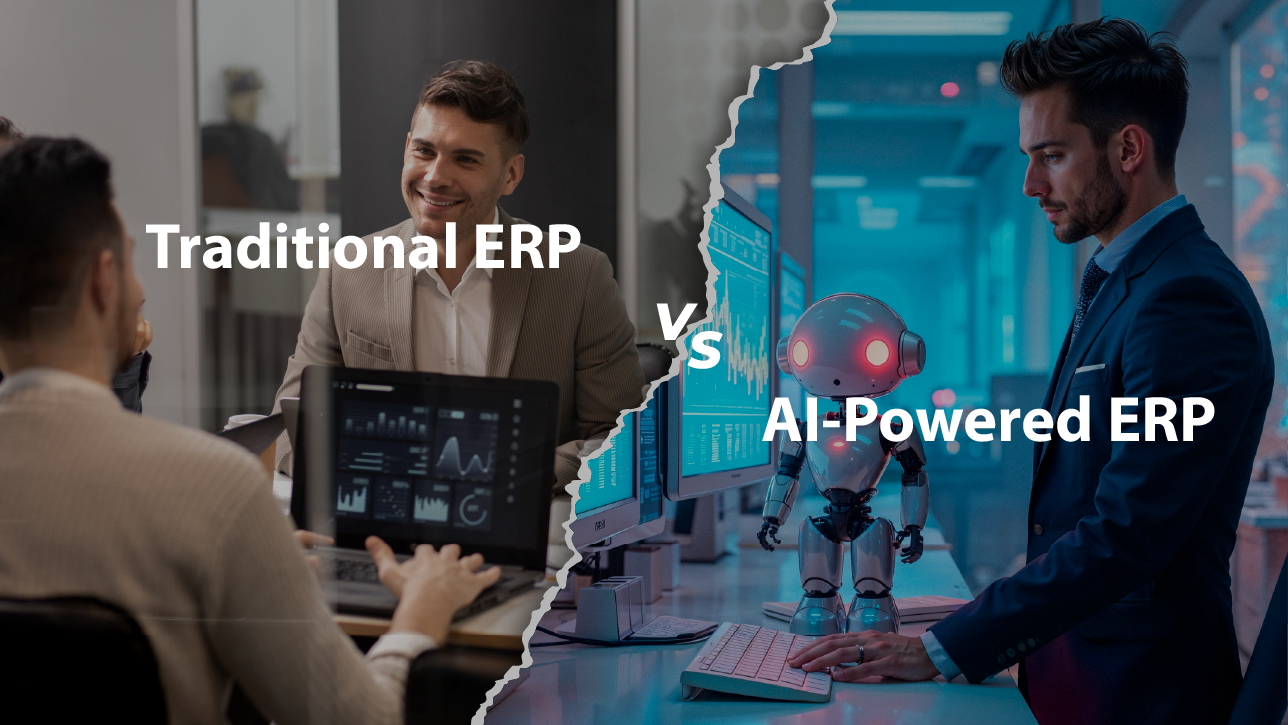Table of Content
From Data to Decisions: Why AI in ERP Is No Longer Optional
Are you aware that according to a recent Gartner report, by 2026, over 65% of large organizations will use AI-embedded ERP systems to enhance decision-making, reduce costs, and automate complex workflows? That’s a significant evolution right? This expansive trend highlights systems of record to systems of intelligence shift where data not only informs but actively drives strategic actions.
In Today’s fast-paced and ever-evolving business landscape, decision-making speed and accuracy are more critical than ever. The game is changed, old-school ERP systems, while foundational for managing core business operations, are increasingly becoming insufficient on their own. The integration of Artificial Intelligence (AI) into ERP systems is transforming how businesses operate, enabling smarter insights and faster actions. No more guesswork. No more “should we, or shouldn’t we?”
Artificial Intelligence infused ERP systems enhance data analysis, improve forecasting, automate routine processes, and deliver actionable intelligence that drives operational efficiency and strategic growth. In this blog, we’ll explore how AI is revolutionizing ERP systems, the benefits it brings to organizations, use cases across industries, and key considerations for successful implementation.
What is AI-Powered ERP Decision-Making? Definition and Benefits
AI-powered ERP decision-making refers to the use of artificial intelligence technologies—such as machine learning, natural language processing, and predictive analytics in ERP—to enhance the data-driven decision-making capabilities of ERP systems. Traditional ERP solutions are excellent at storing and managing data, but they often fall short in delivering real-time, contextual, and actionable insights. Let’s have a look at what leads to AI + ERP= Intelligent Enterprise.
| ERP | AI | ERP + AI = Intelligent Enterprise |
| Centralized data | Predictive analytics | Real-time insights |
| Process control | Machine learning | Smart Automation |
| Business modules | Natural language processing | Forecast accuracy |
With AI embedded, ERP platforms evolve from being passive data repositories to intelligent systems that support and even automate complex decision-making processes. They can now analyze vast datasets at lightning speed, identify patterns, detect anomalies, forecast future trends, and recommend the best course of action- all in real-time. They don’t just make your business more efficient—they make it smarter. With real-time insights, predictive capabilities, and automation you can:
Respond to market changes faster.
Make data-driven decisions with confidence.
Free up human talent for high-value tasks.
Improve customer satisfaction through personalization and responsiveness.
Traditional ERP vs AI-Powered ERP

A comparative overview of Traditional vs AI-Powered ERPs is provided below-
| Feature | Traditional ERP | AI-Powered ERP |
| Data Processing | Manual or rule-based | Automated, real-time |
| Insight Generation | Descriptive only | Predictive & prescriptive |
| Decision Support | Historical data reports | Intelligent recommendations |
| User Interaction | Structured input (forms) | Natural language & voice interfaces |
| Forecasting Accuracy | Low to moderate | High |
| Response Time | Hours or days | Real-time |
| Automation Level | Limited | High |
The rise of self-driving ERP automation takes this a step further. These systems learn from data patterns and adapt without constant human input, reducing manual errors and boosting efficiency. Imagine an ERP that not only tracks inventory but also predicts shortages and places orders automatically—this is no longer futuristic, it’s happening now.
As we move deeper into the digital age, embracing AI in ERP isn’t just an upgrade. Businesses that harness these tools will unlock new levels of productivity, insight, and competitive advantage. Let’s talk specifics now!
Revolutionizing ERP Decision-Making with AI: Microsoft Dynamics 365 AI Integration
Predictive Analytics and Forecasting: AI technologies inside Dynamics 365 Finance offer predictive analytics in ERP and trend analysis which help large enterprises to properly forecast financial performance. Through pattern recognition in past data, companies can forecast cash flow issues, maximize expenditures, and efficiently distribute resources. Dynamics 365 leverages AI to analyze historical data and market trends, enabling businesses to forecast sales, demand, and inventory needs. For example, in retail, it can predict which products will be in high demand during specific seasons, helping optimize stock levels and reduce waste.
Autonomous agents for complex tasks : One of the most revolutionary aspects of Microsoft’s ERP offering is the introduction of autonomous agents. These AI-driven agents are apps that can work alongside you or even on your behalf. Available within Dynamics 365, they manage tasks such as overseeing logistics, adjusting production schedules and conducting financial audits. They learn from every interaction, improving over time to deliver more precise results.
AI virtual assistant for decision-making: Microsoft Copilot is changing the game for how businesses interact with their data. Acting as a virtual assistant, Copilot retrieves data and analyzes it to provide actionable recommendations. For example, if a sales trend shows an unexpected drop, Copilot can identify contributing factors and suggest strategies to address the issue. Or when gaps in production capacity arise, Copilot helps teams evaluate options like subcontracting. Natural language processing allows users to interact conversationally with the system for tasks like inventory enquiries, financial analysis, and creating reports.
Automated Workflows: AI automates repetitive tasks such as invoice approvals, purchase order generation, and customer follow-ups. In Dynamics 365 Finance, for instance, AI can auto-match invoices to purchase orders, reducing manual errors and speeding up the accounts payable process.
Real-Time Dashboards: With built-in Power BI and AI capabilities, Dynamics 365 delivers live dashboards that visualize KPIs, financials, and operational metrics. Executives can monitor performance in real time and make data-driven decisions without waiting for end-of-month reports.
Smart Resource Allocation AI helps assign the right people to the right tasks based on skills, availability, and workload. In Dynamics 365 Project Operations, this ensures optimal use of human resources and improves project delivery timelines.
Smart planning and Budgeting: AI enhances the budgeting process by generating intelligent budget proposals. These proposals consolidate and analyze years of historical data to predict future budgets accurately.
Accuracy: AI-driven budget proposals use historical data to make accurate predictions, improving financial planning and resource allocation.
Efficiency: By automating the budgeting tasks, AI saves time and reduces manual errors, allowing finance teams to focus on strategic planning.
Customer Insights: Dynamics 365 Customer Insights uses AI to unify customer data from multiple sources, revealing patterns in behavior, preferences, and engagement. This helps businesses personalize marketing campaigns and improve customer retention.
Real-World Applications or Use cases across departments: AI in action with smarter insights, faster actions
Let’s explore how AI-powered ERP is transforming specific business functions & industries-
1. Finance AI automates tasks like expense categorization, fraud detection, and financial forecasting. CFOs can now rely on real-time dashboards that highlight anomalies and suggest corrective actions.
2. Supply Chain AI-powered ERP helps forecast demand, optimize logistics, and reduce waste. Companies prevent stockouts and overstock situations with smarter planning.
3. Human Resources AI analyzes employee performance, turnover risk, and hiring needs. HR professionals can make talent decisions based on data-backed insights.
4. Sales and Marketing AI analyzes customer data to personalize campaigns, score leads and forecast sales. This results in higher conversion rates and better ROI.
5. Manufacturing AI helps predictive maintenance by monitoring equipment conditions and alerting teams before a failure occurs. It also optimizes production scheduling and supply chain management based on real-time demand and capacity analytics.
6. Retail AI in ERP predicts customer buying behavior, optimizes inventory levels, and personalizes marketing efforts. Real-time sales data analysis helps retailers respond quickly to market trends and consumer preferences.
Best Practices for Successful Adoption
To maximize the impact of AI-powered ERP decision-making, consider these best practices:
Start Small: Begin with a pilot project in one department before scaling.
Define Clear Goals: Know what you want to achieve—cost savings, faster reporting, better forecasting, etc.
Choose the Right Partner: Work with vendors who understand your industry and offer scalable solutions.
Invest in Training: Empower your team to use AI tools effectively.
Monitor and Iterate: Continuously evaluate performance and refine your approach.
Conclusion
From predictive analytics in ERP to self-driving ERP automation, the possibilities are vast and exciting. Platforms like Microsoft Dynamics 365 AI integration are leading the charge, making these innovations accessible to businesses of all sizes.
AI-powered decision-making in ERP systems is no longer a futuristic concept- it’s a competitive imperative. Businesses that leverage AI within their ERP systems gain the ability to predict trends, personalize experiences, optimize resources, and outmaneuver competitors. While challenges exist, the rewards far outweigh the risks.
Whether you are a sales leader, finance executive, or operations manager, the era of intelligent automation has arrived, and Dynamics 365 is central to this transformation.
If you’re ready to move beyond spreadsheets and static reports, it’s time to embrace AI-powered ERP decision-making & to unlock the full potential of intelligent enterprise management.
Reimagine how your business operates with AI-powered ERP systems. Let Dynamics Square help you implement Microsoft Dynamics 365 for smarter, faster, and more agile decision-making.

Looking for Localised Support Partner?
Let's collaborate with Australia’s trusted localised support partner to maximise your business potential! Let us drive success in your business with our Dynamics 365 Support Services.
Disclaimer– “All data and information provided on this blog is for informational purposes only. Dynamics Square / MPG Business Information Systems Pvt. Ltd. makes no representations as to accuracy, completeness, currentness, suitability, or validity of any information on this site and will not be liable for any errors, omissions, or delays in this information or any losses, injuries, or damages arising from its display or use.”














